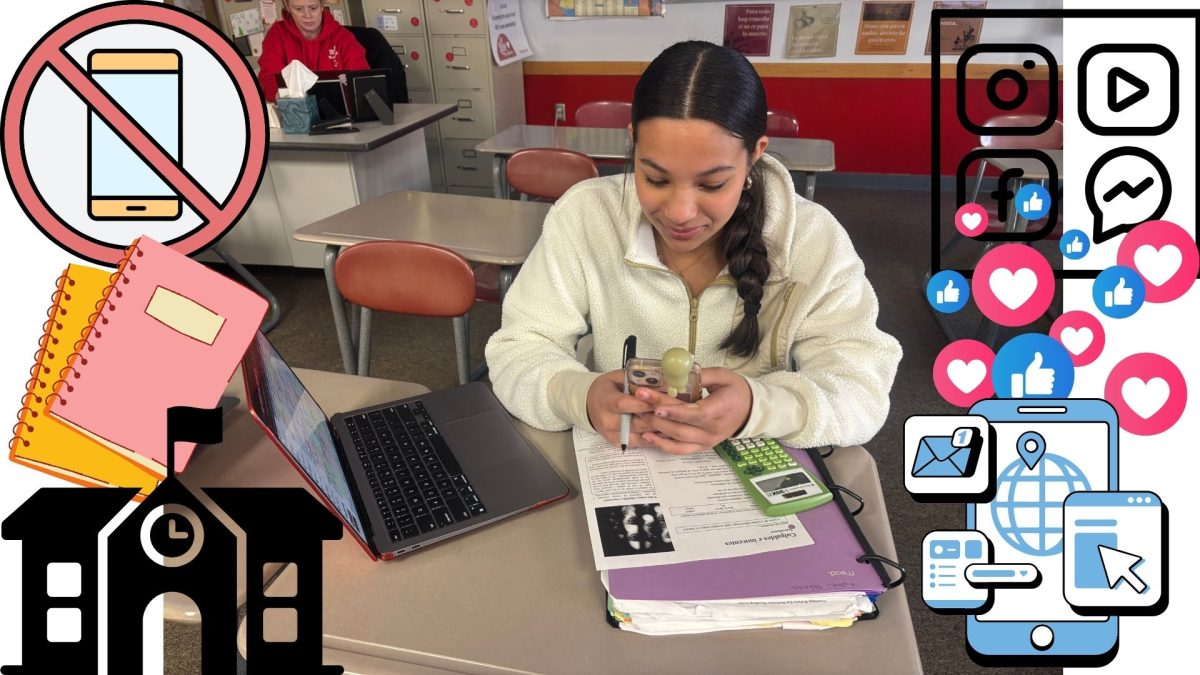In today’s society, the dopamine rush that comes from spending hours upon hours on social media can overtake the lives of students, affecting the BSM community. As students often find themselves spending all day doom-scrolling, their crippling phone addictions can sometimes be prioritized over school work. Whether it’s school work or family time, screens get in the way more often than not. Homework assigned on computers can lead to a new arena of distractions when the student is trying to focus. The struggle to complete homework while fighting the urge everyone has to reach for their phone affects the lives of BSM students, and it is not a problem with a simple solution.
Phones have proven to be deteriorating for studying and memory skills, and overall distract students in an extremely debilitating way. A study was done on undergraduate college students where 119 participants were tested on their recall accuracy while studying with and without smartphones. The results of this study were not shocking, as the students without smartphones had higher accuracy than those with smartphones. This demonstrates the direct negative consequences of our brains constantly seeking the euphoria that comes along with the dopamine that likes or funny videos bring.
Many students try to keep their time managed on social media while they sit down to do their homework but usually fail to follow through with their time limits. Sophomore Alexis Lindgren’s phone constantly distracts her and keeps her from completing homework, especially apps like TikTok and Instagram. Lindgren tries to turn her phone off to lock in on her homework but is inconsistent. “The ratio is even uneven. I spend most of my time on my phone and little hours doing homework,” Lindgren said.
Other students have no trouble putting their phones away to focus on their studies. Sophomore Dominic Rosow explains that his phone doesn’t affect his study habits at all, as he is very consistent with putting it away when doing homework. There is a reason Rosow is able to disconnect. “I don’t really have any social media, so I don’t use my phone [for anything] other than communication,” Rosow said.
It is not only phones that hurt students’ study habits, but screens in general, including computers. English teacher Anne Marie Dominguez has been teaching for 30 years and has noticed that students spending their time studying and staring at screens has been a trend in recent years. Although Dominguez notes that, throughout her teaching career, students haven’t always studied with complete concentration, explaining that students have always studied ineffectively by simply staring at what they have written down rather than truly interacting with the material. Regardless, Dominguez believes that phones have shortened the attention spans of students. Dominguez describes how, in the modern era, students’ sole focus in life is entertainment. If they are not entertained, they are not interested in whatever they are working on, and studying is not something that is entertaining. “Most people can’t stand to just sit and wait and wonder and think about things without pulling out the phone and either checking messages that you’ve already checked, or going on to Apple News, or checking the latest TikTok,” Dominguez said.
According to The University of Chicago Press Journal, the simple fact that our phones exist has a direct effect on not only our study habits but also our cognitive function. As the average smartphone user interacts with their phone 85 times a day and 91% of people say they leave the house without their phone, simply putting the phone away is not an effective solution to this problem embedded into our everyday lives. The dependency many people have on their smartphones goes much further than was previously thought. Most research focuses on how the use of smartphones affects our brains. However, this study showed how the mere presence of smartphones has an effect. This is important because although students might try to put their phones away and focus on their studies, this idea was thrown out the window the second the smartphone was invented. “Turning off your phone, getting away from screens and just reading, reading books, reading the work that is assigned, I think slowly will help build up the ability to sustain your attention and focus on certain things,” Dominguez said.
The age of technology has completely uprooted life as we once knew it. Society is centered around devices that the majority of people are addicted to. When studying, BSM students struggle to focus on their work because they are glued to their phones. Although students try to manage their screen time, studies have shown that the damage is already done, and the fact that their phones are there is enough to distract them. It is important to limit the time you spend on your phone while studying, however, the distractions that come along with the device are never-ending.





































![Teacher Lore: Mr. Hillman [Podcast]](https://bsmknighterrant.org/wp-content/uploads/2025/03/teacherlorelogo-1200x685.png)



